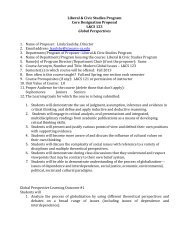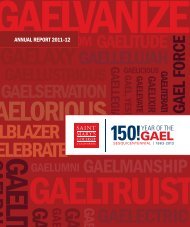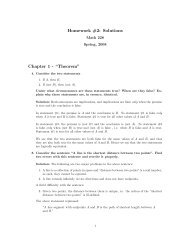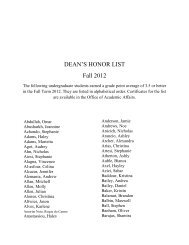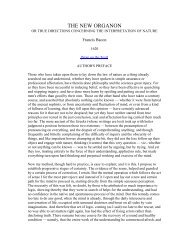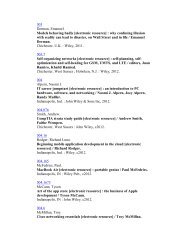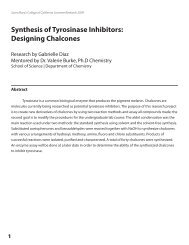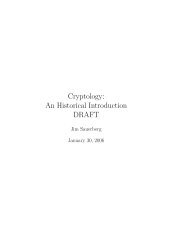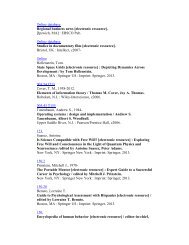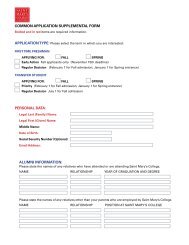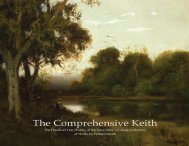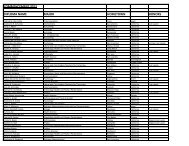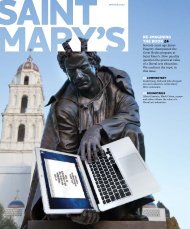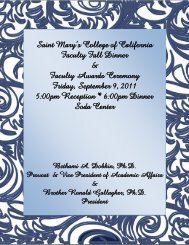2008-09 Catalog - Saint Mary's College of California
2008-09 Catalog - Saint Mary's College of California
2008-09 Catalog - Saint Mary's College of California
You also want an ePaper? Increase the reach of your titles
YUMPU automatically turns print PDFs into web optimized ePapers that Google loves.
Politics CurriculumPoliticsThe politics major is designed to provide a systematic understanding <strong>of</strong> political power, political processes, and politicalinstitutions, both in the United States and the world at large. Politics majors gain insight into public affairs; improvetheir conceptual, analytical, critical and communication skills; and explore normative questions concerning the relation<strong>of</strong> individuals to governments and <strong>of</strong> governments to one another. The curriculum <strong>of</strong>fers courses in five fields:American government, political theory, international relations, public administration, and comparative politics. Thedepartment advises students to divide their work among the five fields, although a concentrated major may be advisedin a particular case. The department also recommends substantial coursework in related disciplines such as economics,history, or philosophy.The politics major is not designed as a vocational major. It provides a liberal arts education that fosters responsible civicengagement and an appreciation <strong>of</strong> diverse political cultures and identities. It prepares students for careers in governmentservice, international affairs, secondary school teaching, journalism, community service, and business. It also serves theneeds <strong>of</strong> students who seek postgraduate education in political science, the law, public policy, and international studies.Students seeking a career in the legal pr<strong>of</strong>ession will find that the Politics Department’s law-related courses will preparethem with a broad background and specific tools with which to undertake their legal education.Students who expect to pursue graduate study in politics should note that knowledge <strong>of</strong> foreign languages and/or statisticsis usually required for a graduate degree. Knowledge <strong>of</strong> modern languages is also particularly important for careers ininternational affairs. Department faculty advisors assist students in the selection <strong>of</strong> appropriate courses.The department participates in several <strong>of</strong>f-campus programs that allow students to combine study with practical experiencein public life. Students may arrange to receive academic credit for internships with local agencies, <strong>of</strong>ficials, or politicalgroups. Students interested in American politics can spend a semester studying at American University in Washington,D.C., which includes an internship with a government agency or interest group. A similar arrangement with the <strong>California</strong>State University in Sacramento provides an opportunity to study <strong>California</strong> state government. Students majoring in politicsmay also participate in the Model United Nations Conference held each year at Harvard University.FacultyPatrizia Longo, Ph.D., Pr<strong>of</strong>essor, ChairHisham Ahmed, Ph.D., Pr<strong>of</strong>essorRonald Ahnen, Ph.D., Associate Pr<strong>of</strong>essorDavid Alvarez, Ph.D., Pr<strong>of</strong>essorWilber A. Chaffee, Ph.D., Pr<strong>of</strong>essor EmeritusStephen Sloane, Ph.D., Associate Pr<strong>of</strong>essorSusan C. Weissman, Ph.D., Pr<strong>of</strong>essorStephen Woolpert, Ph.D., Pr<strong>of</strong>essorSepehr Zabih, Ph.D., Pr<strong>of</strong>essor EmeritusLearning OutcomesWhen they have completed the Politics program, students will be able to:• Perform the following intellectual tasks effectively:– Comprehend texts– Express themselves orally and in writing– Analyze and interpret evidence– Relate theory to practice– Recognize assumptions and evaluate arguments– Draw inferences and make deductions– Engage in collaborative learning and shared inquiry– Select appropriate methods to access, evaluate, and use information• Acquire substantive knowledge allowing them to:– Understand essential political terms and concepts– Appreciate the historical and cultural context <strong>of</strong> political events– Recognize the causes and outcomes <strong>of</strong> political conflict– Understand the dynamics <strong>of</strong> political behavior– Identify political ideas and belief systems– Recognize alternative political groups, structures, regimesand identities– Distinguish different levels <strong>of</strong> political life: individual, local, national,and international• Develop the following habits <strong>of</strong> mind:– Critical and persistent reflection on questions <strong>of</strong> importanceto their lives– Intellectual self-confidence and maturity– Appreciation <strong>of</strong> multiple perspectives and contexts– Curiosity and a commitment to life-long learning– Civic engagement149



